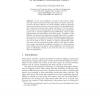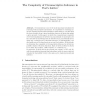37 search results - page 4 / 8 » A Tractability Result for Reasoning with Incomplete First-Or... |
AI
2011
Springer
13 years 2 months ago
2011
Springer
An important question for the upcoming Semantic Web is how to best combine open world ontology languages, such as the OWL-based ones, with closed world rule-based languages. One o...
IJCAI
2003
13 years 8 months ago
2003
Query answering over commonsense knowledge bases typically employs a first-order logic theorem prover. While first-order inference is intractable in general, provers can often b...
AI
2006
Springer
13 years 11 months ago
2006
Springer
So far, most equilibrium concepts in game theory require that the rewards and actions of the other agents are known and/or observed by all agents. However, in real life problems, a...
DLOG
2011
12 years 11 months ago
2011
Query answering in Ontology Based Data Access (OBDA) exploits the knowledge of an ontology’s TBox to deal with incompleteness of the ABox (or data source). Current query-answerin...
LPNMR
2009
Springer
14 years 2 months ago
2009
Springer
Circumscription is one of the most important formalisms for reasoning with incomplete information. It is equivalent to reasoning under the extended closed world assumption, which a...


